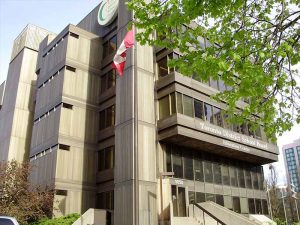 TORONTO — After months of promoting the historic Dead Sea Scrolls exhibit at Toronto’s Royal Ontario Museum, the organizers eagerly welcomed people from all backgrounds to explore the scrolls and other artifacts that offer Jews, Christians and Muslims a link to their past.
TORONTO — After months of promoting the historic Dead Sea Scrolls exhibit at Toronto’s Royal Ontario Museum, the organizers eagerly welcomed people from all backgrounds to explore the scrolls and other artifacts that offer Jews, Christians and Muslims a link to their past.
Some of the fragments of the Dead Sea Scrolls that are part of the exhibit at the Royal Ontario Museum. [Photo courtesy of the ROM and the Israel Antiquities Authority] (video available)
 TORONTO — After months of promoting the historic Dead Sea Scrolls exhibit at Toronto’s Royal Ontario Museum, the organizers eagerly welcomed people from all backgrounds to explore the scrolls and other artifacts that offer Jews, Christians and Muslims a link to their past.
TORONTO — After months of promoting the historic Dead Sea Scrolls exhibit at Toronto’s Royal Ontario Museum, the organizers eagerly welcomed people from all backgrounds to explore the scrolls and other artifacts that offer Jews, Christians and Muslims a link to their past.
Some of the fragments of the Dead Sea Scrolls that are part of the exhibit at the Royal Ontario Museum. [Photo courtesy of the ROM and the Israel Antiquities Authority] (video available)
The Israel Antiquities Authority (IAA) and the ROM have collaborated to produce the exhibition, which opened last week and will be on display until Jan. 3 in the ROM’s new addition, the Michael Lee-Chin Crystal.
Sixteen scrolls, discovered in 1947 buried in caves in the Judean Desert by a Bedouin shepherd, will be divided into two groups of eight and each group will be on exhibit for three months.
Among the 16 scrolls – written between 250 BCE and 68 CE, from the books of Genesis, Deuteronomy and Psalms, as well as the sectarian Community Rule, War Scroll and Messianic Apocalypse – are four that will be on public display for the first time ever.
Ontario Premier Dalton McGuinty was at the media preview event on June 24, during which photographers and videographers were given the only opportunity to photograph and film the exhibit.
“My hope is that all people, people of all ages, faiths and backgrounds, will come together to marvel at the scrolls and take this rare opportunity to discuss their meaning and significance,” McGuinty said.
Premier Speaks (full)
Dead Sea Scrolls guest curator Risa Levitt Kohn, an alumna of both York University and University of Toronto and director of the Jewish studies program at the San Diego State University, said that the show is about more that the scrolls themselves.
“This show is a show about the world from which they came, the culture that spawned the scrolls,” she said, adding that the texts are a key to the ancient people at a critical juncture as the ancient Israelites transformed into the early Jews and early Christians.
“In fact, this is my favourite exhibition, because these scrolls, these small, fragmented, aged parchments are truly a link between us and the past,” Levitt Kohn said.
Uzi Dahari, deputy director of the IAA, who was in Toronto last week for the opening of the exhibit, said that despite the painstaking efforts to safely transport the scrolls to Toronto and create ideal conditions to put them on display while preserving them, it’s worth it to be able to share these artifacts with people around the world.
“We demand a lot of conditions. First of all, you can exhibit a scroll under certain conditions for three months and then it must rest for at least a year in a climate-controlled condition without any light,” said Dahari, who has a PhD in archeology from the Hebrew University of Jerusalem.
In addition to biblical scrolls and non-biblical texts from the Book of War and Apocryphal Psalms, the exhibit will also showcase jars that held the scrolls in the caves for hundreds of years, oil lamps, bibles and a fragment from the Temple Mount from the first century BCE.
As part of the exhibition, there will also be a limited presentation from Oct. 10 to 18 of a fragment from Deuteronomy that depicts the oldest written expression of the Ten Commandments.
The Anne Tanenbaum Lecture Series, featuring some of the world’s most renowned scholars on the Bible and the Dead Sea Scrolls, is meant to compliment the six-month exhibit.
Each lecture will take place at the ROM, with the next lecture by Yuval Peleg, the district archeologist from Eastern Samaria and the Jordan Valley, scheduled to take place on July 2.
The lectures will run until December. For a listing or to register, visit www.rom.on.ca/scrolls and click on “events,” or call 416-586-5797.
The ROM also partnered with the Koffler Centre of the Arts to display contemporary artwork by Joshua Neustein, who “explores themes and ideas suggested by the scrolls, shaping a dialogue with their historical and cultural traditions.”
“I have seen a lot of exhibitions of the scrolls in many other venues around the world, believe me,” Dahari said.
“This is the most beautiful one, in my opinion. The ROM did a beautiful job.”
Despite the excitement surrounding the historic exhibit, the opening did not come and go without controversy.
On June 25, Palestine House, a non-profit educational and cultural centre in Mississuaga, Ont., issued a statement calling for a boycott of the exhibit.
The call came two months after Palestinian officials called on the Canadian government to cancel the show, because of claims that the scrolls were acquired illegally by Israel when the Jewish state annexed east Jerusalem in 1967.
The Palestine House statement said that it’s calling for a boycott because the ROM is “displaying the artifacts looted by Israel from the Palestine Archaeological Museum. This is not the ethical or legal standard Canadians expect of the ROM.”
It said it will boycott the exhibit unless the ROM admits the scrolls are Palestinian property.
In response to the claims from Palestinians that the artifacts are stolen property, Dahari said that at the moment, that debate is “irrelevant.”
“Let’s say the debate is that they say we are not the owners of the scrolls. OK, they can say that, but we are protecting the scrolls now. It is our responsibility. We are preserving the scrolls, we are investing a lot of money in doing it, we have the best lab to protect the scrolls… So we also exhibit them according to our responsibility of the curators at the moment,” Dahari said.
“Even concerning the law, the only state that ever acted according to the Hague Convention [for the protection of cultural property] in 1954 was Israel, when it returned all the antiquities excavated by Israelis in the Sinai to Egypt after the peace agreement was signed between us,” he added.
“To say that we are stealing their heritage, it’s chutzpah. It is an insult. I don’t understand. I am a historian, so I know that Islam is from the seventh century AD. The scrolls are from the second and third century BC and first century AD. This is not their heritage… This is Jewish heritage. It is written in Hebrew. It is our language, our Bible. What do they want from us?
“The Dead Sea Scrolls were written by Jews, were hidden in the desert by Jews… and they should remain in Israel.”






